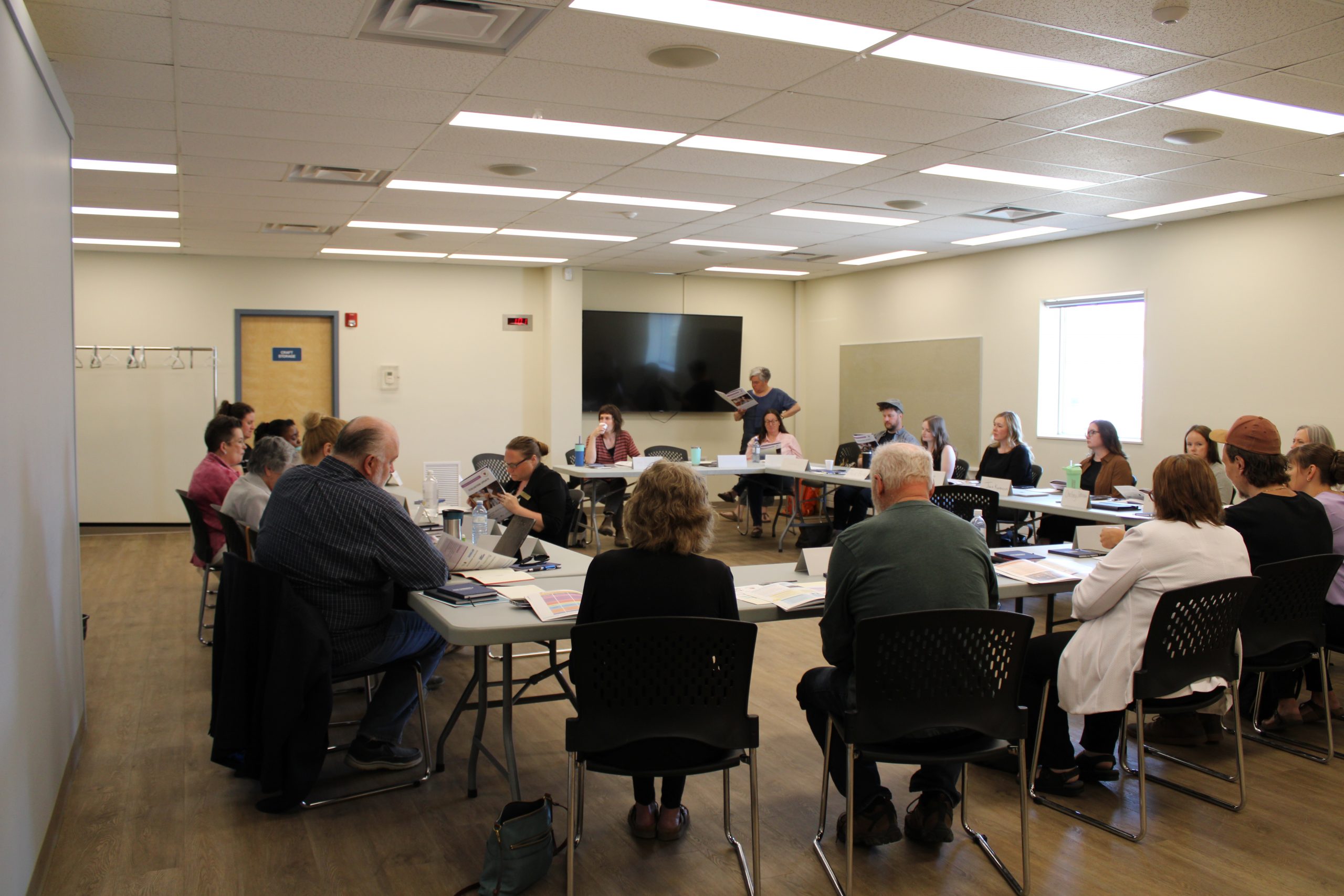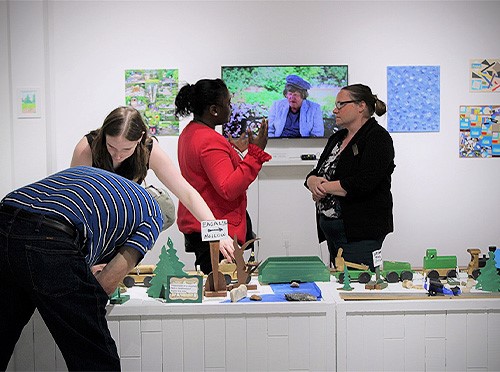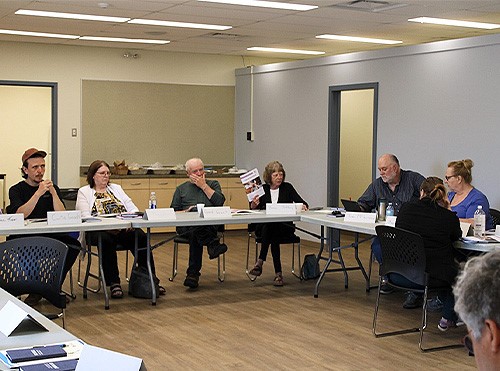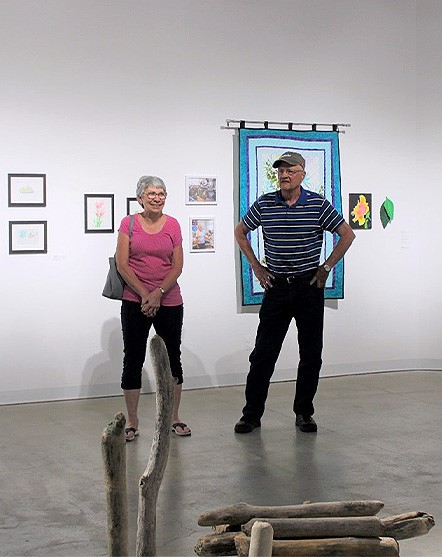Collective Impact Project Meeting
Saskatchewan The Saskatchewan Population Health and Evaluation Research Unit (SPHERU) team and collaborating organizations of the Dementia Supports in Rural Saskatchewan project met in person for the first time over the five-year project in Yorkton on May 15th.

The organizations that make up the Dementia Supports in Rural Saskatchewan project met in person for the first time since the project’s inception three years ago, this past May.
They all have vastly different initiatives on the go, but all of the collaborating organizations involved in the project share the same goals:
- Enhancing the social inclusion of people living with dementia and their care partners
- Addressing Gaps in Support and Services in Rural Saskatchewan
- Improving public awareness of dementia, and reducing stigma
As part of the project, the Alzheimer Society of Saskatchewan is leading an awareness campaign and engaging organizations to explore how they might become more inclusive and accessible for people living with dementia and their care partners. Approximately 60 percent of people with dementia live in their homes in their local communities. Jackie Hofstrand, the Alzheimer Society’s Dementia Community Coordinator, has engaged 36 organizations and businesses in 15 different communities in the project area of Yorkton, Melville, and surrounding rural communities.
“I really enjoyed attending our first in-person collective impact meeting on May 15th. It was nice to meet many that I have only known through screens up until now. I loved hearing all the updates from everyone, especially the new projects just starting or that will be starting.
“[It] really brought home how, by supporting each other’s projects, we have created so much support for those with dementia and their care partners in Yorkton and the area.”“[It] really brought home how, by supporting each other’s projects, we have created so much support for those with dementia and their care partners in Yorkton and the area.”
– Jackie Hofstrand Dementia Community Coordinator- Alzheimer Society of Saskatchewan

Other community organizations that attended the collective impact meeting included Parkland Valley Sport, Culture, and Recreation District, the City of Yorkton, SaskAbilities, Godfrey Dean Art Gallery, Rural Dementia Action Research (RaDAR) through the University of Saskatchewan, and – the most recent group to join the project – Sakitawak Elders Group.
The Sakitawak Elders Group wants to address dementia in the community of Île là Crosse, with the goal of improving the quality of life of people living with dementia and their care partners.
Another example of the more recent initiative in Dementia Supports in Rural Saskatchewan is Cognitive Kitchen, facilitated by Dr. Julie Beitel and Dr. Allison Cammer from the University of Saskatchewan. Cognitive Kitchen focuses on enhancing nutrition knowledge and skills in older adults living with dementia and their care partners.
Members of the Dementia Supports in Rural Saskatchewan’s project’s advisory committee also attended the meeting, including Gord Grant and his wife, Claudia, who have utilized the services of the Alzheimer Society.
“The support groups and education programs offered by the Alzheimer Society, like coffee and chat, are something a lot of us really look forward to and appreciate. These events have given us a good base on which to travel this journey and we feel are where we are in this journey because we chose to take advantage of the education made available through the Alzheimer Society.
It would be great to have more people from the Yorkton area involved in these meetings to connect and support each other.”
– Gord Grant, Dementia Supports in Rural Saskatchewan project advisory committee member

The organizations discussed the progress of their individual projects, as well as the next steps and sustainability of the project. Dementia Supports in Rural Saskatchewan is intended to end in the summer of 2024.
The Alzheimer Society looks forward to our next steps with our project initiatives. We have partnered with Parkland Valley Sport, Culture, and Recreation to create resources for recreation facilities to help make their programming and facilities more dementia friendly for people living with dementia and their care partners.
After the collective impact meeting, the group toured the Godfrey Dean Art Gallery’s Belong Where You Find Yourself art exhibit, which is a part of the project. We were pleased to also be joined by multiple Dementia Supports in Rural Saskatchewan participants, including Merle and Dean Wiley, who took the time to engage the group about their experiences with creating art and reminisced about the relationships they built during the process.

Merle also worked with Jackie from the Alzheimer Society on making the library in Saltcoats more dementia friendly and is passionate about making her community more accessible and inclusive for people living with dementia and their care partners.
“As a board member for the Saltcoats Library, I was so pleased how quickly Jackie Hofstrand replied to emails to come look at our Library. Also, how quickly she was able to come. Jackie gave us sound, practical advice on how to make our Library more dementia friendly. We were able to implement her suggestions right away. She commented on how great it was to see a quiet corner. It is such a wonderful program and staff to work with.”
– Merle Wiley, a Person with lived experience and Saltcoats Library Board member
